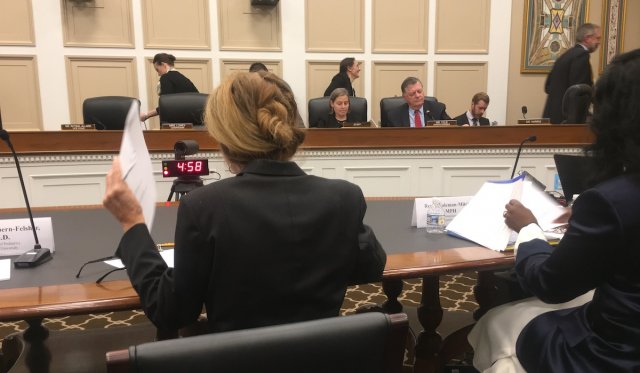

WASHINGTON — One of the biggest proponents of electronic cigarettes has taken a step back after the emergence of more information in the wake of at least 33 deaths since the crisis began.
U.S. Rep. Tom Cole (R-OK), ranking minority member of a House Appropriations subcommittee, said one of his main concerns has become the addiction in children.
This story was reported by Gaylord News, a Washington reporting project of the Gaylord College of Journalism and Mass Communication at the University of Oklahoma.
“Everybody hears it anecdotally. My son’s a public school teacher, I hear about it from him,” Cole said in an interview this week. “In the old days, you can only smoke before school, after school and maybe at lunch. Now you’re right in the classroom and you don’t even know what’s happening half the time.”
Cole has been linked with vaping for some time. In 2016, Vice wrote a feature piece about how Cole is one of the biggest allies and an “unlikely champion,” to vape, but he only smokes cigars. Cole reposted the article on his website.
The most recent data from the Centers for Disease Control and Prevention confirmed what Cole has been hearing from his son. A quarter of school-aged children vape, but a third of those kids use illegal black market marijuana cartridges, according to Anne Schuchat, CDC Principal Deputy Director of Prevention.
Schuchat said the largest problem the CDC is facing is that there is not enough research or funding for research to find out what illness is facing those who vape, or what exactly caused the 33 deaths thus far.
“People using these products do not know what is in the liquid solutions, and chemicals within the solutions may change when aerosolized in the e-cigarette or other vaping device,” said Schuchat.
During a House Appropriations Subcommittee on Labor, Health and Human Services, Education and Related Agencies hearing last week, representatives asked if illegal THC cartridges or black market vaping tools were causing the illnesses and deaths. Schuchat said the research doesn’t back that up.
“No one product, brand, chemical, or additive has been determined to be the cause of these lung injuries,” she said. Schuchat also said there hasn’t been enough time to determine “long term consequences from lung damage in surviving patients.”
Cole said he is considering backing a raising of the minimum vaping age to 21 nationwide to help combat the youth epidemic, but believes banning vaping devices altogether will increase black market sales and therefore the amount of deaths.
“We clearly have a youth problem and we need to make sure that we don’t have a next generation that’s addicted to nicotine,” Cole said. He said he was open to listening and change “as long as we don’t throw the baby out with the bathwater.”
Parents Against Vaping E-Cigarettes co-founder Meredith Berkman said she wanted Congress to ban vaping flavors — something Cole is still deliberating.
Sally Satel, a resident scholar at the American Enterprise Institute, said the flavors help former smokers quit, but Berkman and others who support stronger regulation said that the flavors are geared to get children addicted.
“Without question, we must reduce teen vaping but other, non-prohibitionist solutions can help achieve that imperative,” said Satel. “We must not impede vital access to vaping products for the 11-14 million adult vapers who might otherwise smoke instead or for the 38 million smokers who could switch to vaping if they cannot quit smoking by other means.”
Satel argued that the number of vaping deaths — at least 33 — is still less than the 480,000 who died from smoking this year, according to the CDC. She emphasized that vaping reduces harm compared to smoking, but doesn’t eliminate it completely.
“[Cigarettes] release 7,000 chemical compounds including 70 known human carcinogens. In contrast, electronic cigarettes…release some toxins, but the overall toxicological profile is far less hazardous than that of cigarette smoke,” said Satel.
As for the illness, Satel brought up vitamin E acetate, which is an additive used to cut counterfeit vape products and cannabis vape juice to create a cheaper product. Satel argued that the majority of illnesses come from these black market products.
“Consumers have been using commercially available vaping devices and nicotine products for 10 years without a single recorded death or any surge of illnesses…until this summer. What we are observing today is consistent with a relatively acute contamination,” Satel said.
Cole said he wants to have another hearing with some British researchers who can say why vaping is a problem in the U.S., but not in the U.K.
“They see this as an incredible tool and smoking cessation, and they don’t seem to have had the youth problem, so what are we doing differently?” Cole said.
So what can parents and current e-cigarette users do? Schuchat said to remember that no nicotine product is safe.
The CDC also recommends former smokers who use e-cigarettes to not return to cigarettes. Adults addicted to nicotine and vape should consider utilizing FDA approved nicotine replacement therapies, according to the CDC.
The CDC also calls vape dangerous for children and pregnant women. The center also encouraged medical marijuana users to find an alternative mode of administration from vaping THC products.
“We’re moving in the right direction, but again, the problems out ahead of us, no doubt about it,” Cole said.
For more resources on the potential dangers of vape, visit the CDC public information page here.





















